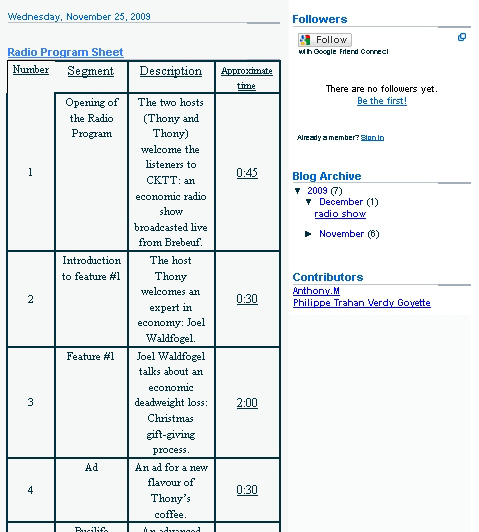Making Fond Memories of Youth Meaningful
English second language students at Collège Jean-de-Brébeuf are good! Bound for university, and exposed, for most, to an Anglophone milieu from an early age, my Advanced 1 (Level 3-102) students as well as my students in the International Baccalaureate (IB) program bring a lot of sophistication to their studies. At this skill level, notwithstanding all of their talents, however, students have a lot of trouble using a formal register in their English writing and conversation.
The question of getting students over this inability to use English at a register appropriate for the worlds of business, politics, medicine and academia has been a particular goal of mine. Over the past two terms, for my Advanced 1 course, for example, I have tried to create an environment where questions of tone and register could be addressed effectively. The idea started because I realized that students are always multitasking. They’re on Ipods, laptops, etc., and for them picking up a book and reading it is foreign. Even when they do their homework, they are most likely listening to music and texting at the same time. How could I get a francophone student who is comfortable in English to transfer that comfort into their dealings with literature?
Last year I had my students create blogs in groups of three or four. Therefore there were about ten blogs per class. As my Advanced 1 course is geared more towards literature, students’ blogs covered really interesting tasks through the interpretation of literary texts in terms of mood and tone. In some of these blogs, one way to convey these stylistic intangibles was to produce a video with music and images using Windows Movie Maker, a program which is usually bundled with the Windows operating system. Once the videos were uploaded, students then provided a text, explaining what they were trying to achieve with that video using the descriptive language that was the ultimate target of my efforts.

The header of a blog with a radio program
My Rep-TIC at Brebeuf, Jean Allard, was my guide into this world of technology. Together we looked for a solution which was user-friendly yet wouldn’t present security problems.. Blogspot was really easy to learn and by having students make their blogs by invitation only, they could be assured that their early efforts would not be on public view. Making groups of three or four was also an important decision as at least one member of each group would be tech savvy. Those people were there as resources for the other team members although everyone was responsible for contributing texts and excerpts.

Script of a radio program.
Another problem that concerned me was plagiarism, which is so easy in electronic media. To forestall any temptation on their part, I ask my students to write their articles in class. They hand in their texts on paper which I then comment on and hand back to them to change on their blog. I realize my current solutions are really only temporary fixes, and this year I’m looking to get better results without sacrificing the safeguards I’ve put into place. Jean has suggested that I integrate some of my blogs into the LEA content management system which is hosted at Brébeuf. This intranet setup allows my students to have access to other blogs, which remain private.

Summary of an article.
To be honest, besides the technical issues, I’m still not quite sure where this is going in terms of content. Last term, some comments were too unacceptably informal. Comments have to be thoughtful, intelligent and relevant or the technology becomes nothing more than a toy. In general, I would also like my students to interact more. My ideal would be some sort of chat room where everyone uses formal language! Still working to get a more formal register out of my students, I’ve considered a type of rotating role play. Each week students comment on the readings with a specific task at hand. For example, one of their tasks includes indentifying vocabulary that is relevant to a theme, while another involves relating a part of the story to a personal experience. The following week, in addition to tasks changing, students comment on the contributions of their teammates from the previous week.
As for my IB students, their classes are not about literature, but professional and academic English. There is easier syntax and simple and concise vocabulary. In the second term they have to learn academic English which involves more use of the passive voice. This term they’ll film themselves documenting a cause or concern in their field of study and uploading it to their blog. In March I’ll be creating a blog with business students at UNISINOS, a university in southern Brazil. These students complete part of their program at HEC Montréal, where I also teach, and they are the same age as my IB students. Both groups are incredibly curious, dynamic and a lot of fun. I have no clear idea as to where a blog involving these two groups will go, but I’m sure that having them interact will lead to new and interesting ways to use this medium in a language class.
Students have fun doing these activities. They’re no longer just using paper and pencil, but interacting with the material that is being produced in their group. Their motivation is creating something with technology that is linked to language which makes it both meaningful and fun. As I watch them, caring about their work, I feel they are learning things that will stay with them. When I think back to when I was 17 or 18, I had some memorable experiences which have stayed with me. I see IT as a way of helping my students look back at their English classes as pleasurable experiences that stayed with them for the rest of their lives.

